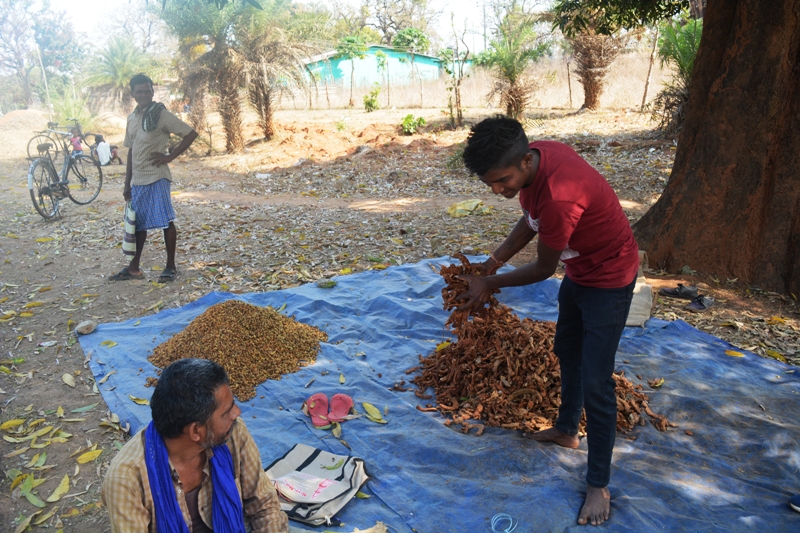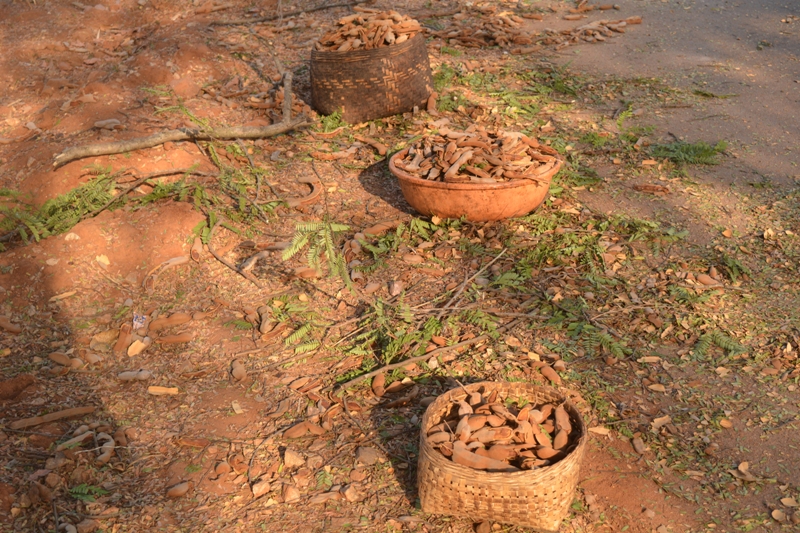
As tamarind is an important minor forest produce, there is a minimum support price offered for it which stands at Rs 36 per kg for seeded ones. It ensures proper price to tribal gatherers for their labour., writes Deepanwita Gita Niyogi
On a hot afternoon at Metapal village in Dantewada district, small-scale trader Ranat Kumar was busy buying tamarind from tribal collectors and storing it in sacks. It was the weekly market day, locally known as haat bazaar at Metapal, a tribal-dominated village in southern Chhattisgarh. In the midst of his transaction with a tribal collector, Kumar informed that tamarind was fetching Rs 30 per kg while weighing the produce on a scale.
During the collection and sale period of minor forest produces, traders like Kumar either visit villages or flock to rural markets. Tamarind offers tribal families a viable livelihood option in the state. “It is a busy day for me and my business keeps me occupied during the tamarind collection season which starts from the middle of March and continues almost up to April-May,” Kumar said.
In the midst of conversation, Ungo Veko, a tribal man from nearby village Mandoli, approached Kumar with tamarind. Much of the tamarind collected from Dantewada ultimately reaches the main market in Jagdalpur, the district headquarters of Bastar, about an hour’s drive.
A little way away from Kumar’s place, another trader Sukhdev Sinha said the produce is also sold at Geedam block of Dantewada district while some amount is kept at cold storages for future use. He added that a lot of effort goes into collecting, drying and extracting the seeds.
Tamarind produced in Chhattisgarh is in huge demand in southern states like Andhra Pradesh where deseeded tamarind is sold at Rs 80 per kg. Kumar, however, admitted keeping a minimal profit margin. “Traders like me make profit in the range of Re1 to Rs 2 per kg of tamarind we buy from collectors even though prices are high in south. We also don’t get time to extract the seeds.”
Self-help groups roped in
In Dantewada’s Katekalyan block, a 10-member women’s self-help group called Ramkrishna Susahayta Samuh purchases tamarind from tribal women gatherers. Before the formation of the group, its members were mostly engaged in agricultural activities. But the women made a valuable contribution during the Covid-19 period by visiting tribal houses and offering cash to collectors for purchasing tamarind. In about 15 days in March this year, the group procured tamarind worth Rs 17 lakh.
As tamarind is an important minor forest produce, there is a minimum support price or MSP offered for it which stands at Rs 36 per kg for seeded ones. MSP ensures proper price to tribal gatherers for their labour.
Shakuntala Thakur, who leads the self-help group in Katekalyan, said it was formed in 2014. “But our activities picked up during the pandemic when we approached tribal women directly with cash which helped them during the difficult period,” she added while pointing out sacks of tamarind neatly stacked at a corner in her house. Women’s self-help groups were brought in to remove small-scale traders who often offer less than the MSP.

Lalit Manjhi, a forest guard of Dantewada range, said cash for purchasing tamarind is given by the forest department. Manjhi and other field staff have been on strike since March 21. However, this did not affect collection as money was paid to the self-help groups before the strike started. He also admitted that small-scale traders like Kumar often prove to be a problem and women’s groups have to compete with them.
As tamarind trees are huge, often gatherers shake the lower branches with the help of wooden planks to ensure that the fruits fall on the ground. After that, the ground is cleared of dead leaves and tamarind gathered is kept in baskets. Later, it is sold in rural markets or collected door-to-door by women’s self-help groups. In Dantewada, there are 88 such groups for collection.
Dantewada divisional forest officer Sundeep Balaga said collection of minor forest produces has been going on for the past two years in an intensive manner through women’s groups. “The penetration of self-help groups has picked up since Covid-19. But this year collection as such was not hit by the staff strike even though transportation was a little bit affected in a few places.”
In Dantewada, the tamarind collection target this year stands at 20,000 quintals and collection at the time of filing the story stood at 4,935 quintals.
Role of minor forest produce
In Chhattisgarh’s tribal villages, rural communities depend on the collection and sale of minor forest produces for livelihood throughout the year. These include Tendu leaves, Sal seeds, tamarind and mahua flowers, among many others. The collection and sale of minor forest produces are part of the Centre’s Van Dhan Scheme which aims at improving tribal income. TRIFED spearheads the implementation of Van Dhan across India.
When it comes to Chhattisgarh, there are about 18 minor forest produces traded. To give a boost to all minor forest produces, a total of 139 primary processing centres have been identified in the state. In 2020 amidst the lockdown, an estimated 51,000 quintals of tamarind was procured worth Rs 15.80 crore. The women’s self-help groups played a pivotal role.
Apart from Dantewada, in Gariyaband district which is 95 km from Raipur, tamarind production has crossed 2,500 quintals, said divisional forest officer Mayank Agrawal. The last date for collection was April 15.












